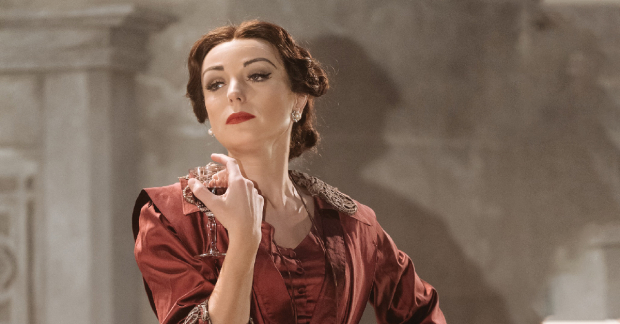Review: My Cousin Rachel (Richmond Theatre)

© Manuel Harlan
Why is a man rarely described as beguiling, conniving or scandalous? In classic British tales, these words are all too often reserved for a woman, perhaps one who is set on tricking an innocent, morally pure, youthful gentlemen out of his hard-earned – or in this case inherited – fortune. While My Cousin Rachel is not primarily about the traditions of the English language, it does allude to the gender imbalance that has become so expected in literary works of the era. But though it is at times intriguing, overall this play falls into the trap of being predictable and unsurprising.
A grieving ward and an unsuspecting widow are thrown together over the matter of a Cornish estate in Joseph O'Connor's 2012 stage adaptation of the Daphne du Maurier novel. Film versions have starred the likes of Richard Burton (1952) and Rachel Weisz (2017) – a radio adaptation in 2011 pit Damian Lewis against Lia Williams. This restaged production has Helen George as lead Rachel Ashley, with a petulant – albeit uninspiring – Jack Holden playing Philip Ashley, the naïve 20-something who ultimately profits from his mentor's – Rachel's husband Ambrose – passing.
The best moments of the show are the more intimate snippets where genuine emotion is given the opportunity to shine. The purity of a Christmas carol sung in close harmony; the silences when words need not be spoken because the intention rings crystal clear, these are the points in Anthony Banks' direction that resonate through the theatre. And certain cast members are better equipped to take advantage – both Sean Murray as faithful servant John Seecombe and Simon Shepherd as Philip's supportive godfather are the two most worthy of note.
These more introverted instances best suit George's performance too, which is most effective when her character is given the chance to breathe. Known for her heartfelt role as nurse Trixie Franklin in Call the Midwife, George comes across best on this stage when there is little other distraction around. Her expressions, her speech and its inflection are subtly layered and understated. At times they fall flat, especially in some act one scenes that move at a steady but unyielding pace – introspective pauses and character interactions are too often cut short by the next line or muffled by a sound cue and subsequent scene change.
If the first half proceeds along its trajectory like the proverbial tortoise – slow and steady – then the second act is the hare, racing full pelt towards the play's conclusion and exhausting itself – and the audience – out by the climax. It's mainly an issue of O'Connor's stage adaptation – the script works so hard to set up complex, multi-faceted relationships that it has no time to exploit these with any sense of resolution. Instead it falls into the trap of attempting a sensationalist ending that is instead far too obvious. The whole production becomes less a quaint English country drama and more an episode of Midsomer Murders.
My Cousin Rachel succeeds in tiny moments, glimpses of tenderness and seemingly throwaway lines that are emphasised and given new relevance – "I am a woman so I shall always be a servant" rings particularly true in the 21st century. But for all the show tries to stand strong and with gravitas, it withers too easily to be memorable or long-lasting.












